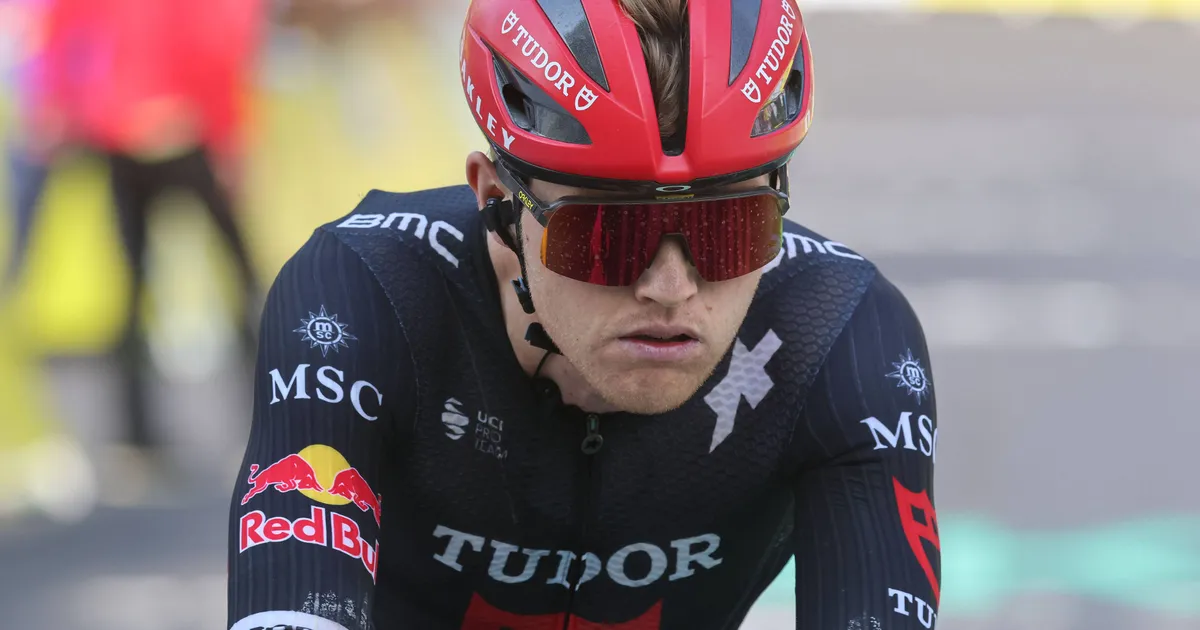That support helped produce one of Storer’s most notable
performances of the race, a third-place finish on stage six. Ironically, he
hadn’t planned to be in the breakaway that day. “We had some funny analogies
like, ‘Michael’s still in the fridge staying fresh,’ I was supposed to stay
quiet until stage 10. But then I saw how the race was developing. It took over
two hours for a breakaway to form, and no one from our team was in it. So I
followed Simon Yates, and that ended up being the move.”
The call to jump wasn’t pre-approved, but it paid off.
“Those days where you’ve done two hours of racing and then you’re the guy who
follows just one move into the break, you feel pretty badass.”
Tudor’s strategy, however, wasn’t without friction. “There
were arguments before the race, after the race, and on the radio about
tactics,” he said. “In the end, I have to do what they say.”
He agreed with fans who thought he’d chased too many
breakaways. “Totally agree. But that wasn’t my decision, that was the team’s
decision.”
Despite missing out on a win, Tudor was seen as one of the
Tour’s most visible teams. “Yeah, definitely a success. We’re joking that we
didn’t win a stage, but we won the hearts of the fans. We won at social media,”
Storer said. “Julian especially. After he finished third, L’Équipe ran a huge
front-page photo of him. I don’t think they actually know who won that stage.”
Storer spent much of the race in breakaways, including
several with Quinn Simmons. “I’d say it’s all respect. I talked to him a lot
during the Tour. If I was going into a breakaway, he’d be one of the people I’d
be hoping is in there too. That guy pushes some big numbers. If you need to
stop the peloton, he’s the one. But if you need to beat the guy, that’s a
problem.”
Modern breakaways, Storer said, are nothing like what they
used to be. “The 10-minute breakaways are finished. It’s all about forcing the
breakaway now. The peloton doesn’t let you go, they have to be broken. That
makes the racing extremely hard.”
He pointed to dangerous road conditions and poor preparation
outside of the Tour as part of the problem. “That’s why we crash going in a
straight line, like we did in Naples at the Giro. The road was filthy. I knew
we were all going to crash that day.”
Storer also didn’t shy away from commenting on Tadej Pogacar’s
selective stage hunting. “At least one day, I had some info that Tadej decided
not to win that stage. I find it a bit weird if you get your team to ride full
gas all day and then on the last climb you just decide not to win. If you don’t
want to win the stage, decide that beforehand.”
Storer’s move to Tudor from Groupama – FDJ was about more
than bikes, it was about being valued. “I wanted to go to a team that actually
cared about making me good. Groupama doesn’t have the best support structure.
They kind of just expect you to be good, but not actually do anything to help
you be a good cyclist.”
At Tudor, things are different. “I’m pretty much their main
guy. So they’re throwing a lot of resources behind me to help me be good.”
As for Fabian Cancellara, the team’s marquee name and
co-owner, his role is largely symbolic. “He’s pretty hands off. He doesn’t have
a huge influence on the day-to-day. His real role is more ambassadorial.”
One topic Storer found particularly ridiculous? Watches in
racing. “I’m totally fine with not wearing a Richard Mille on the cobbles.
Cyclists are so focused on aerodynamics, then wear watches with drag. It makes
no sense.”
He also dismissed overhyped recovery hacks. “There’s no
magic cherry juice potion that’s going to fix your recovery. Maybe it’s 0.1% of
your recovery. If I was an amateur, I wouldn’t be buying cherry juice.”
Asked about changes he’d like to see in the sport, Storer
didn’t hold back. “The handlebar rule is stupid. Wider bars are probably more
dangerous. The UCI point system is also dumb. It should be on a one-year cycle.
If it was, we’d be WorldTour at the end of this season. And they should sweep
the roads before races. That’s why we crash in straight lines sometimes.”
His advice for juniors was as thoughtful as it was
practical. “Where you really need to be good is under-19s if you want to make
it pro. Focus on school. Do school as well as you can, it’s the only time you
get free education. Make your training efficient and have a social life. That
sets you up for a better future.”

